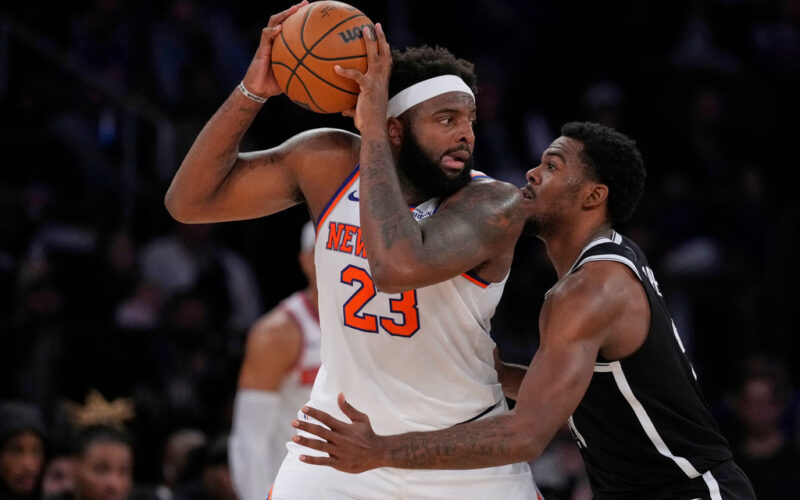Knicks head coach Mike Brown pushed back Tuesday on the idea that starting center Mitchell Robinson, whose surgically repaired left ankle has been managed under a strict protocol, will be in and out of the lineup all season.
“Well, I’m not sure about that,” Brown said after Robinson sat the first leg of the Knicks’ back-to-back against the Memphis Grizzlies. “We just gotta take that thing one game at a time and follow the lead of our medical people in terms of what the process is gonna be.”
Robinson underwent two procedures to repair stress fractures in his left ankle, the most recent coming two offseasons ago — a surgery that sidelined him until late February. He entered this season fully healthy, appeared in the first halves of New York’s first three preseason games, and then was held out after halftime of the Oct. 9 exhibition against the Timberwolves.
From there, the Knicks shut him down for the final two preseason contests and the first four regular-season games. Robinson made his season debut on Halloween in Chicago, logging 20 minutes in the loss to the Bulls. He is not expected to play in both legs of any back-to-backs this season.
Yet since the starting center’s return, his workload has gradually increased, and Brown said the big man’s conditioning continues to improve.
“I do know in terms of continuing to ramp him up, his stretches — he can go longer with his stretches. He can go longer with his minutes now than before,” Brown said. “So it’s constantly on the rise, based off what [Knicks VP of Sports Medicine] Casey Smith and his group tell us night in and night out.”
Robinson’s absence remains a focal point for a team that’s found its offensive rhythm but is still searching for defensive consistency.
The Knicks lead the NBA in offensive output to open Brown’s first season but have surrendered several high-scoring quarters without their defensive anchor in the middle. Against Memphis, New York hung its seventh 40-point quarter of the season and built a 28-point second-half lead — then gave up 39 third-quarter points as the Grizzlies trimmed the margin to 10 before the Knicks closed it out.
They’ve also allowed a 40-point second quarter to Brooklyn and 72 second-half points to Chicago on Halloween — Robinson’s first game back.
“Tonight it wasn’t about Mitch. [Memphis] killed us in transition,” Brown said, after watching his team give back double-digit leads twice Tuesday night. “You give them credit because they kept fighting, but we could have had anybody on the floor — and if we got back in transition the way we did tonight, it would’ve been bad.”
According to NBA stats data, the Knicks are allowing 25.3 transition points per game, ranking among the league’s bottom 10. But Brown’s own internal tracking paints an even grimmer picture.
“The way we calculate it, it’s 16 fast-break points against us in the first half, and in the second half, we let up,” he said. “We just didn’t sprint back like we should have and they got layup after layup after layup in transition, which gave them confidence. Giving up 29 fast-break points to a team in a half is gonna kill you.
“We didn’t do a good job following our rules while we were getting back. We just kind of nonchalantly got back, ran next to our guy and then hoped everybody was matched up — and you can’t do that.”
Team captain Jalen Brunson said the breakdowns came from hesitation and communication lapses.
“I think hesitation, lack of communication. We’re communicating late, and it’s too late by then. We’re in rotation and they’re getting open threes,” Brunson said. “We’ve gotta obviously stop the ball, then once a person does that, we’ve gotta feed off each other. Get the bodies, once we get the matchups, get into our shifts and help out.”
All-Star center Karl-Anthony Towns echoed his coach’s urgency in cleaning up transition defense — particularly against elite shooting teams.
“Transition threes. They hit threes and we didn’t do a good job of stopping the bleeding,” Towns said. “It’s good to learn, it’s good to be reminded how great this league is and how great these teams are. It only takes a couple minutes to take away all the good work we did in a day.”
And when asked what the fix is, Towns didn’t overcomplicate it.
“Just gotta be better. Simple as that,” he said. “Just gotta do it.”








